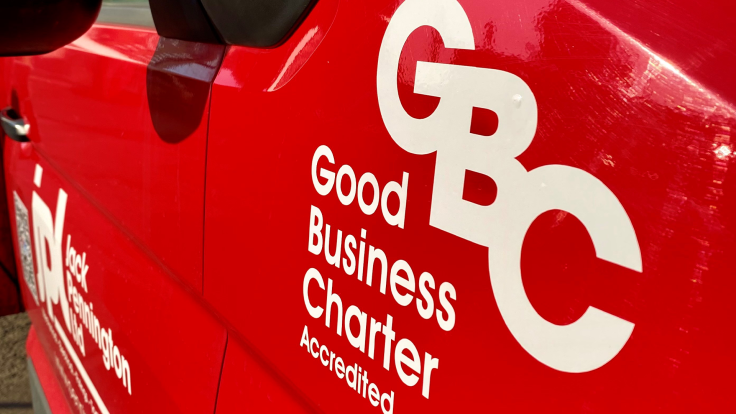Approximately 3.7m people in the UK are working low-paid and insecure jobs
The Good Business Charter has redefined its brand to encourage ethical business practices across 10 key areas as poor conduct remains a problem in the UK economy.
This February, following its third anniversary, the Good Business Charter (GBC) has created "a new look and a big vision", with the aim of encouraging "a new minimum standard of working and living in the UK". The redefined GBC brand will be rolled out online in the coming months.
Founded by Julian Richer in 2019, the idea is that employees and consumers will favour businesses that are accredited for ethical practices. In this way, the ultimate objective of the GBC is to help employees and consumers, with businesses possessing the capacity to make that impact through improved practices. GBC is partnered with the CBI (the Confederation of British Industry), the TUC (the Trade Union Congress), and FSB (the Federation of Small Businesses), and aims to provide such accreditation.
GBC's brand redefinition comes after successful growth in the last three years since its launch in February 2020. GBC reached the milestone of 1000 members in March 2022. Key members include St. James's Place, the first FTSE100 member, and TSB, the first retail bank member, who both joined in 2020. Amongst many other large private and public sector organisations, notable members include Aviva, Deloitte, and London City Airport.
Following TSB's joining of the GBC, the then Chief Executive Debbie Crosbie explained how the "highest ethical standards" are expected of businesses. Amelia James, former Corporate Responsibility Project Manager at St James's Place, has said that membership of the GBC reflects a "commitment" to the objective of being a "leading responsible business".
With accreditation open to organisations of all sizes in all sectors, GBC analyses practices across ten different areas covering employee conditions, tax, the environment, and supplier and customer treatment. Crucially, businesses have to adhere to ethical practices in all 10 areas to gain accreditation. This means that where a business is accredited, consumers and employees can trust they are ethical across a broad range of important areas.
These ten ethical practices include:
- Paying the real living wage (as defined by the Living wage foundation) to all directly employed staff and regularly contracted staff.
- Fairness in the use of zero-hours contracts. For example, in scheduling and cancellation policy.
- Fairness and transparency in employee well-being policy.
- Ensuring employer representation. For example, ensuring a representative voice is present for employees at the boardroom table.
- Commitment to diversity and inclusion, with monitoring of workforce diversity.
- Commitment to environmental policy that reflects a desire to reduce the impact on the environment.
- Developing a transparent relationship with HMRC, with a commitment to paying all due taxes, and avoiding tax avoidance.
- Organisations must publish customer commitments on their website, with monitoring of customer feedback.
- A commitment to ethical trading standards, specifically in sourcing.
- The signing of the government's Prompt Payment Code, to ensure prompt payment to suppliers.
For organisations in the public sector, charities and other organisations in the third sector, the fair tax requirement is not applicable.
Poor business practices in the UK
The value of the GBC is underscored by the continuation of poor business practices in the UK. In their 2023 annual report, GBC explains that some business decisions still dismiss the interests of individuals, treating them as commodities, and not "valuing them as human beings".
They refer to the example of the March 2022 P&O hire and rehire scandal, in which a group video call was used to make staff redundant.
The report also states the following statistics which reveal the ethical shortcomings of business practices in the UK. According to the Living Wage Foundation, the number of people in low-paid and insecure work is approximately 3.7 million, 12 per cent of the UK workforce. Furthermore, the number of UK jobs paying less than the real living wage is 3.5 million. According to the Health Foundation, of those in poverty, 59.9 per cent live in a household where someone works.
Whilst the cost of living crisis has prompted strike action over wages, the report notes the growth in CEO pay after the pandemic, meaning that a "sense of unfairness" is prevalent within UK society. As workers struggle with limited pay, ensuring that companies are trustworthy in their business activities can help address that sense of unfairness.
However, according to the 2021 FRC Workforce Engagement Report, the number of FTSE350 companies with worker directors on their boards is just 2 per cent. Furthermore, only 13.7 per cent of private sector works are "protected by a collective agreement" (BEIS, Trade Union Membership, 2021).
As well as issues over pay and employee representation, tax avoidance, insecure zero-hours contracts, and lack of environmental sustainability are ethical problems tarnishing business practices in the UK economy.
According to HMRC, the estimated tax gap is £32 billion, 5.1 per cent of tax liabilities. According to Zero Hours Justice, nearly 25 per cent of adult social care jobs are zero-hours contracts. Furthermore, according to Small Business Britain, only 31 per cent of small businesses have invested in sustainability.
Lastly, on the issue of the gender pay gap, whilst it has decreased in the last three years, the gap is far from closed.
© Copyright IBTimes 2025. All rights reserved.






















